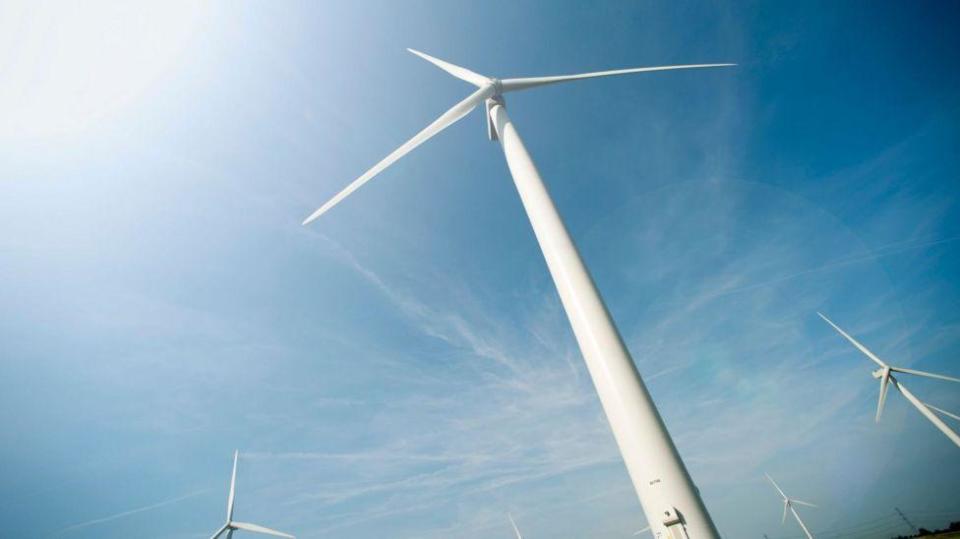Labour will bring a “huge number” of skilled jobs to Scotland by basing the HQ of its new energy company there, Sir Keir Starmer says.
The party plans to create a publicly-owned company called Great British Energy.
On an election campaign visit, the Labour leader said the firm would drive the transition to clean energy and make sure “those jobs are in Scotland rather than other countries”.
The SNP has criticised the the project, saying it would “destroy Scottish jobs and investment”.
Speaking to BBC Radio’s Good Morning Scotland programme, Sir Keir said Great British Energy would be set up very quickly “if we are privileged enough to come into power”.
He said: “As we transition into clean power there is the potential for a huge number of skilled, long-term, well-payed jobs.
“GB energy will be the driver of that to make sure that those jobs are in Scotland.
“In Europe, in America, initiatives are already under way to get ahead on renewables. I want Scotland, the UK to be in the race.
“We will base it in Scotland as the energy sector is so important in terms of renewables.”
Sir Keir is in Scotland to launch a new logo and website for Great British Energy.
The firm would be headquartered in Scotland, where much of the UK’s oil and gas and offshore wind industries are based.

Labour would fund the company through a windfall tax on oil and gas firms, which they said would raise £8.3bn over the next five years.
Great British Energy would invest in wind and solar projects, and well as new technologies including floating offshore wind, hydrogen and carbon capture and storage.
But the SNP has said the scheme would use “Scotland’s energy wealth” to fund nuclear projects in England and could cost thousands of north sea jobs.
Deputy leader Kate Forbes told BBC Breakfast that neither Labour nor independent experts “seem to understand or know what GB energy actually is”.
She said: “We know that in Scotland a lot of our jobs depend on the energy industry.
“Independent experts have suggested that the plans would perhaps jeapordise 100,000 jobs in the north east of Scotland.
She added: “We all know that we need to reach net zero, but Labour appears to be saying to workers you’ll lose your jobs now – but there may be some jobs in 10 years time if you hold on.”
The Scottish government previously pledged to set up a publicly-owned, not-for-profit company to sell gas and electricity to customers at low prices by 2021.
The plan was announced by Nicola Sturgeon at the SNP conference in 2017, but was eventually ditched without the company being created.


Sir Keir rejected suggestions that the GB Energy project would bring job losses and said: “I’m convinced transition will bring more jobs to Scotland”
He added: “We’re not going to turn the pipes off instantaneously, we’re not going to revoke any licences in place.
“The question is what we do about the transition, with oil and gas for decades to come as part of the mix.”
The Conservatives criticised Labour’s moves to stop new oil and gas licences in the North Sea, claiming jobs would be at risk.
Scottish Conservative MSP Murdo Fraser told BBC Scotland News: “Many experts on energy policy have looked at this and wondered how is it going to deliver what Keir Starmer is claiming.
“How are we going to be able to buy and sell energy more cheaply than the very competitive energy market we now have?
“People are wondering what difference it is going to make?”
The Liberal Democrats have pledged to invest significantly in renewable power so that 80% of the UK’s electricity is generated from renewables by 2030.
The party also wans to improve standards for new homes to ensure they are warm, cheap to heat and produce zero emissions.
The Scottish Greens want the country to reduce its reliance on fossils fuels, and have said they will create a fair and sustainable energy system for the future.
They have argued that energy and benefits from the renewables revolution should be shared by everyone, and have said they will support councils to create “local energy companies” to build publicly-owned renewables, earning profits to fund public services.

